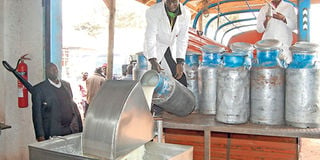How group saves farmers the agony of low milk prices

Employees at the Mumberes Farmers’ Co-operative Society Limited in Baringo collect delivered milk. The society serves over 3,000 farmers, 1,700 from Baringo County and the rest from neighbours Nakuru and Kericho. PHOTO | FRANCIS MUREITHI | NMG
What you need to know:
- The society serves over 3,000 farmers, 1,700 from Baringo County and the rest from neighbours Nakuru and Kericho. Each of the farmers keeps an average of four animals.
- Barno notes the society has the capacity to process 16,000 litres of milk per day but due to low supply, they are only doing 11,000.
- Mumberes buys farmers’ produce at between Sh28 and Sh35 per litre. At the price, Koima notes that they are making some profit but not as much as the others buying at lower prices.
- Their challenges include fluctuating milk prices, importation of powdered milk, dominance of the sector by the big processors and poor infrastructure in the region, which has slowed down its expansion.
A 200-metre earth road snakes from Equator Trading Centre in Baringo County and terminates at Mumberes Farmers’ Co-operative Society Limited.
The Seeds of Gold team finds the society’s workers receiving hundreds of litres of raw milk delivered by lorries queuing at the main entrance.
It is a spectacle to behold as the workers donning white overcoats, caps and gumboots check the quality of the milk before emptying in massive steel tanks.
The society serves over 3,000 farmers, 1,700 from Baringo County and the rest from neighbours Nakuru and Kericho. Each of the farmers keeps an average of four animals.
The dairy plant that was started as a land buying company by elders in the 70s has become a beacon of hope for the thousands of dairy farmers in the largely arid region as the sector grapples with low milk prices amid high cost of production.
The society was started by some 72 members who contributed Sh300 each seed capital.
“At Mumberes, farmers set the milk purchase price, unlike with other players,” says Benjamin Barno, the chairman of the institution.
Barno notes the society has the capacity to process 16,000 litres of milk per day but due to low supply, they are only doing 11,000. Mumberes produces Cow Gold milk product brands that include yoghurt, which it sells at between Sh30 and Sh95.
The society has milk collection centres on the borders of Nakuru and Kericho and surrounding counties where several vans collect the produce and deliver to the processing plant.
CHALLENGES
“Once it arrives here, we check the parameters agreed upon in the milk supply contract. The alcohol level should be at 80 per cent, fat levels at 3.5 per cent and the milk should have minimal foreign matter,” says David Kipkoskey Koima, the manager.
Mumberes buys farmers’ produce at between Sh28 and Sh35 per litre. At the price, Koima notes that they are making some profit but not as much as the others buying at lower prices.
“We boost our revenue through other services such as transportation since we have invested in a tanker which we hire out,” says Koima, adding the farmers are paid every month and access veterinary services that include artificial insemination.
The firm has employed 32 workers who include graduates, certificate and diploma holders.
Their challenges include fluctuating milk prices, importation of powdered milk, dominance of the sector by the big processors and poor infrastructure in the region, which has slowed down its expansion.
“We want to expand our investment portfolio and diversify our products but the playing field is not levelled for upcoming firms such as Mumberes,” says Barno, adding that a Sh3.5 million loan from Kenya Commercial Bank helped them expand their operations.
Dr Olivier Kashongwe, a lecturer at the Animal Science Department, Egerton University, notes that for such a society to succeed, it must have prudent management skills and observe quality control.
“Milk is a sensitive product and quality tests must be done at the receiving point and at the laboratory while the recipes for making yoghurt must be used at the recommended quantities to preserve colours and fermentation,” says Dr Kashongwe.
The dairy expert says workers’ hygiene is paramount to avoid contaminating milk at all stages of the processing.




